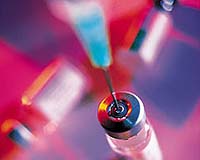| . |  |
. |
Washington (AFP) July 22, 2009 Governments and scientists around the world ramped up the hunt for a vaccine to battle the swine flu pandemic Wednesday, with Australia launching human trials for a serum. US officials announced they were searching for volunteers to run their own trials of two swine flu vaccines and a Chinese drug company said it would soon test its own preparation to fight the A(H1N1) virus, which has killed more than 700 people worldwide. British pharmaceuticals giant GlaxoSmithKline also said Wednesday it was making "rapid progress" on producing another vaccine to be ready by September. The hunt for a vaccine accelerated as swine flu -- declared a global pandemic by the World Health Organization (WHO) -- continued its spread both in southern regions currently in winter and amid the summer in Asia and Europe. While swine flu has been less virulent than seasonal flu forms, scientists fear the virus could mutate into a more deadly version in a reprise of the Spanish and Asian influenza pandemics that killed millions in 1918 and 1958. The WHO said on Tuesday that the death toll worldwide from swine flu since the outbreak was first identified in Mexico in April had jumped above 700, a 40 percent leap from early July. Human vaccine trials began Wednesday at Australia's Royal Adelaide Hospital, involving some 240 adults and 400 children. "As soon as I have confirmation that the vaccine is safe and effective, I will ensure it can be rolled out to the community," Australian Health Minister Nicola Roxon said. Australia has pre-ordered 21 million shots of vaccine from CSL Biotherapies -- enough to cover its whole population -- after being hit by more than 14,000 cases and 38 deaths linked to the disease. CSL spokeswoman Rachel David said many people had volunteered for the vaccine trial because they wanted to avoid catching the disease. "We're talking about kids aged between six months and nine years and it involves two injections and two blood tests, so four needles to monitor the results," she told public broadcaster ABC. In the United States, the country worst hit with more than 40,600 reported cases and 263 deaths, authorities said they were planning trials of two vaccines, the one developed by CSL and a second from drugmaker Sanofi Pasteur. "The trials are being conducted in a compressed timeframe in a race against the possible autumn resurgence of 2009 H1N1 flu infections," the National Institute of Allergy and Infectious Diseases said in a statement. Initial volunteers will be aged 18 or older and will be given two doses of vaccine 21 days apart, it said. "If early information from those trials indicates that these vaccines are safe, similar trials in healthy children (aged six months to 17 years old) will begin," it said. In China, state news agency Xinhua said Hualan Biological Engineering Inc had completed a swine flu vaccine last month and would test it on more than 2,000 volunteers in the city of Taizhou in the eastern province of Jiangsu. The agency quoted company officials as saying the vaccine could hit the market in September, with production of up to 600,000 doses per day. The World Health Organization's top vaccine researcher, Marie-Paule Kieny, warned this month that all countries needed access to vaccines as the virus was "unstoppable." China has seen 1,668 cases of the virus, according to health ministry statistics, but no deaths have been reported. Meanwhile, Arab health ministers meeting in Cairo tentatively agreed Wednesday to ban some people including the elderly and young children from the annual pilgrimage to Mecca in an effort to contain the spread of swine flu. Upwards of two million people are expected in Saudi Arabia over the next five months on pilgrimages, or hajj, to Mecca and Medina. "Some groups will be excluded from hajj: people over the age of 65, people under the age of 12 and people with chronic illnesses," Ibrahim al-Kerdani, WHO spokesman in Egypt, said after the meeting. But he said the decision had to be ratified by the health ministers' governments. In Brussels, the European Union's top health official warned the summer tourist season in Europe was bringing a spike in the number of swine flu cases. "It is expected that the number of cases in Europe will rise more rapidly during the summer period due to the higher migration flows, the tourist season," EU Health Commissioner Androulla Vassiliou told reporters. Share This Article With Planet Earth
Related Links Epidemics on Earth - Bird Flu, HIV/AIDS, Ebola
 South Africa tests first African-made AIDS vaccine
South Africa tests first African-made AIDS vaccineCape Town (AFP) July 23, 2009 South Africa has launched human trials of the first African-produced HIV vaccine, as scientists seek new approaches to battling AIDS in the world's worst-affected country. The locally produced vaccine, being tested in Soweto and Cape Town as well as a site in the United States, was the highlight of an international AIDS conference in Cape Town this week where the trial was officially ... read more |
|
| The content herein, unless otherwise known to be public domain, are Copyright 1995-2009 - SpaceDaily. AFP and UPI Wire Stories are copyright Agence France-Presse and United Press International. ESA Portal Reports are copyright European Space Agency. All NASA sourced material is public domain. Additional copyrights may apply in whole or part to other bona fide parties. Advertising does not imply endorsement,agreement or approval of any opinions, statements or information provided by SpaceDaily on any Web page published or hosted by SpaceDaily. Privacy Statement |